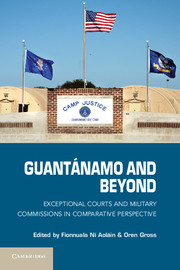Book contents
- Frontmatter
- Contents
- Contributors
- Acknowledgments
- Introduction: Guantánamo and Beyond
- Part I Military Commissions and Exceptional Courts in the United States
- 1 The Development of an Exceptional Court
- 2 Military Commissions in Historical Perspective
- 3 Contemporary Law of War and Military Commissions
- 4 Military Commissions and the Paradigm of Prevention
- 5 Prevention, Detention, and Extraordinariness
- 6 In Defense of Federal Criminal Courts for Terrorism Cases in the United States
- 7 Exceptional Courts and the Structure of American Military Justice
- 8 Exceptional Courts in Counterterrorism
- Part II Exceptional Courts and Military Commissions Elsewhere
- Part III International Law, Exceptional Courts, and Military Commissions
- Index
- References
2 - Military Commissions in Historical Perspective
Lessons from the United States – Dakota War Trials
Published online by Cambridge University Press: 05 June 2014
- Frontmatter
- Contents
- Contributors
- Acknowledgments
- Introduction: Guantánamo and Beyond
- Part I Military Commissions and Exceptional Courts in the United States
- 1 The Development of an Exceptional Court
- 2 Military Commissions in Historical Perspective
- 3 Contemporary Law of War and Military Commissions
- 4 Military Commissions and the Paradigm of Prevention
- 5 Prevention, Detention, and Extraordinariness
- 6 In Defense of Federal Criminal Courts for Terrorism Cases in the United States
- 7 Exceptional Courts and the Structure of American Military Justice
- 8 Exceptional Courts in Counterterrorism
- Part II Exceptional Courts and Military Commissions Elsewhere
- Part III International Law, Exceptional Courts, and Military Commissions
- Index
- References
Summary
IN THE AFTERMATH OF SEPTEMBER 11, 2001, PRESIDENT BUSH declared that alleged perpetrators of terrorism against the United States would be brought to trial not in Article III federal courts, but instead before military commissions. It was commonly recognized that these would be distinct from military courts-martial, a form of dispensing justice familiar within the United States. But what kind of courts these would be and what challenges they would pose was far from clear. Throughout American history, military commissions had been used irregularly and rarely, most recently to try a handful of enemy combatants shortly after the end of World War II. Given the contemporary use of military commissions, it behooves us to consider what the historical use of such bodies can teach us about their risks and utility.
Created in a somewhat different guise as a structure for adjudication during the Mexican-American War and employed – although not without challenge – during the Civil War, the military commission was also the form of tribunal invoked in the trial of almost 400 Dakota who fought American soldiers in a brief frontier war in 1862. Of the 392 combatants who were tried, 323 were convicted, and 38 were hanged in the largest mass execution in American history. Bound up in the history of the new state of Minnesota and the relations between Americans and American Indians, the significance of the events for American military and political history was long ignored. With the rising importance of military commissions and the continuing controversy over their legitimacy, it is enlightening to explore problems associated with their early use and reflect on the contemporary salience of those concerns.
- Type
- Chapter
- Information
- Guantánamo and BeyondExceptional Courts and Military Commissions in Comparative Perspective, pp. 55 - 72Publisher: Cambridge University PressPrint publication year: 2013
References
- 1
- Cited by

